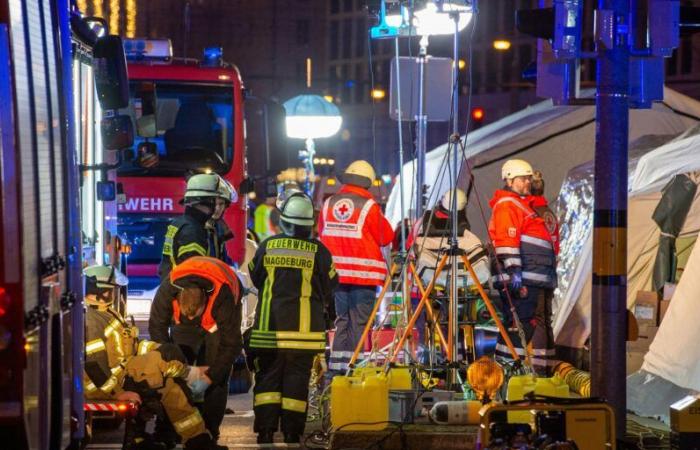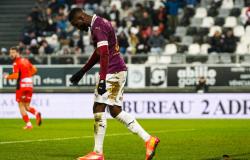A few hours after the car-ramming attack on the Magdeburg Christmas market, the suspect's motives remain particularly murky, say the German authorities. The human toll continues to rise, with five dead and dozens injured. If the attack is reminiscent of that in Berlin in 2016, it is difficult to profile the suspect at the moment.
A few hours after the car-ramming attack at a Christmas market in the city of Magdeburg in Germany, the suspect's motives remain unclear. This Friday evening, a motorist drove his car into the crowd, killing at least five people and injuring 200, local authorities point out in a latest report.
The rest after this ad
The rest after this ad
What to remember
- At least five people died in the car-ramming attack on the Magdeburg market. Another 200 people were injured
- The motives of the main suspect are still unclear. German Interior Ministry says man is “Islamophobic”
- Olaf Scholz promises to act against “those who want to sow hatred”
“Everyone was then lying on the ground.”
“What happened today affects a lot of people, it affects us a lot,” Fael Kelion, a 27-year-old Cameroonian living in the city, told AFP. Around 7 p.m. (6 p.m. GMT), a powerful car suddenly rushed into the aisles of the local Christmas market, mowing down onlookers one by one in its path over 400 meters. Still provisional assessment of this carnage: 5 dead, including a child, and more than 200 injured, including around fifteen seriously, announced the Minister-President of the Saxony-Anhalt region, Reiner Haseloff.
“We saw the roof of the car, then it happened. Everyone was then lying on the ground, children, men, injured people with open fractures, it's unimaginable,” a witness told the television channel Welt TV.
The rest after this ad
The rest after this ad
“It's terrible, there was a dead body next to me all this time. I thought I was just going to the Christmas market and such a thing happens. The world is sick,” added his partner. The attack occurred eight years almost to the day after a similar act committed at a Berlin Christmas market, while Germany, in the middle of an electoral campaign, is on alert against the risk of attacks.
An attack eight years after that of Berlin
For authorities, the date is not a coincidence and was chosen deliberately. But no one immediately drew the conclusion that it was, as in Berlin in 2016, an Islamist attack. Because the profile of the alleged perpetrator, presented in the German media as Taleb A., arrested aboard the ram car, is intriguing.
The rest after this ad
The rest after this ad
Living in Germany since 2006, a doctor practicing in the town of Bernburg, near Magdeburg and with refugee status, he was not at all known for his sympathies with the jihadist movement. On the contrary, his frequent positions on social networks paint the portrait of a man feeling persecuted, having broken with Islam and denouncing on the contrary the “dangers” of an Islamization of Germany.
Some media even attribute connections to the German far right. In any case, he was known in the community of Saudi immigrants in Germany and helped asylum seekers, particularly women. “The motivations remain mysterious, an Islamist background seems excluded,” judges the weekly Der Spiegel.
The rest after this ad
In front of journalists, German Interior Minister Nancy Faeser assured that the alleged perpetrator is “Islamophobic”. Asked about the suspect's motivations, she declared that “the only thing” she was able to confirm “is that he is Islamophobic” in view of his known positions.
Scholz promises to act against “those who want to sow hatred”
German Chancellor Olaf Scholz vowed on Saturday to “act against those who want to sow hatred”, calling on the country to “stick together” after the deadly attack which led to the arrest of an original suspect Saudi.
“It is important as a country to stay together, that we stick together and that we talk to each other,” declared the Chancellor at the scene of the tragedy, assuring: “we will not let those who want to sow hatred pass.” .
Momentum of international solidarity
The German far right has nevertheless taken up this matter in the run-up to the early German legislative elections on February 23, where the question of immigration will play an important role, following several attacks committed in recent months by strangers.
“When will this madness end?” wrote on the X network the co-president of the AfD Alice Weidel, whose party is credited with second place in the polls, at almost 20%. The party places itself behind the conservatives, who are also calling for a tightening of the screws on the reception of refugees, but ahead of the social democrats of Chancellor Olaf Scholz.
For Fael Kelion there is little doubt. “I think that since (the suspect) is a foreigner, the population will be unhappy, less welcoming,” he says. Several capitals expressed their “shock”, like Rome, Madrid and Washington, with the United States saying it was ready to “provide aid”.
French President Emmanuel Macron and his new Prime Minister François Bayrou expressed France's “solidarity”. Saudi Arabia, the suspect's country of origin, condemned the attack and affirmed its “rejection of violence”.






